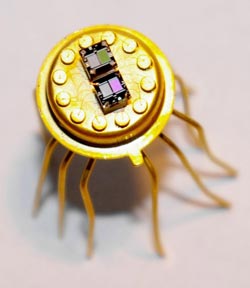Ripe pineapple and delicious pork

Customers want fresh food, which is neither unripe nor spoiled. A new system based on metal oxide sensors could check the safety and quality of foods reliably, quickly and economically -- such as how ripe that pineapple really is. Credit: Fraunhofer IPM
Major suppliers might soon be able to call on the help of a novel system that uses volatile components to detect when the pineapple is ripe and when it can be delivered to the supermarket. The system has been developed by researchers at the Fraunhofer Institutes for Molecular Biology and Applied Ecology IME in Schmallenberg and for Physical Measurement Techniques IPM in Freiburg.
It checks gas emissions on-line – directly in the warehouse for instance. “We have brought together various technologies based on the use of metal oxide sensors, similar to those installed in cars, for example, to close ventilation vents when driving through a tunnel. Researchers at IPM have developed these sensors further. If a gas flows over the sensor, at temperatures of 300 to 400°C, it will burn at the point of contact.
The subsequent exchange of electrons changes the electrical conductivity,” explains Dr. Mark Bücking, Head of Department at IME. “Before the gas reaches these sensors, it has to go through a separation column with polymers. Certain substances are already filtered out here.” A prototype of the analysis equipment already exists. Initial tests were promising – the system measures the volatile substances just as sensitively as conventional equipment used in food laboratories. In a further step the researchers want to optimize the system and adapt it to specific problems. Bücking reckons that the equipment could come onto the market at a four-digit euro price.
The researchers are also investigating whether the equipment could be used to test pork. The male pig produces hormones and certain odorous substances necessary for reproduction. What the female pig finds attractive, however, smells anything but pleasant to human noses. It's true that most pigs are slaughtered well before sexual maturity – before any odorous substances have formed in the majority of pigs. As there is the risk, however, that some boars could produce odorous substances prematurely, all boars are castrated when they are young piglets. Castration may not be necessary in the future if the pork could be tested on-line before it is packaged.
Media Contact
More Information:
http://www.ime.fraunhofer.deAll latest news from the category: Life Sciences and Chemistry
Articles and reports from the Life Sciences and chemistry area deal with applied and basic research into modern biology, chemistry and human medicine.
Valuable information can be found on a range of life sciences fields including bacteriology, biochemistry, bionics, bioinformatics, biophysics, biotechnology, genetics, geobotany, human biology, marine biology, microbiology, molecular biology, cellular biology, zoology, bioinorganic chemistry, microchemistry and environmental chemistry.
Newest articles

Webb captures top of iconic horsehead nebula in unprecedented detail
NASA’s James Webb Space Telescope has captured the sharpest infrared images to date of a zoomed-in portion of one of the most distinctive objects in our skies, the Horsehead Nebula….

Cost-effective, high-capacity, and cyclable lithium-ion battery cathodes
Charge-recharge cycling of lithium-superrich iron oxide, a cost-effective and high-capacity cathode for new-generation lithium-ion batteries, can be greatly improved by doping with readily available mineral elements. The energy capacity and…

Novel genetic plant regeneration approach
…without the application of phytohormones. Researchers develop a novel plant regeneration approach by modulating the expression of genes that control plant cell differentiation. For ages now, plants have been the…





















